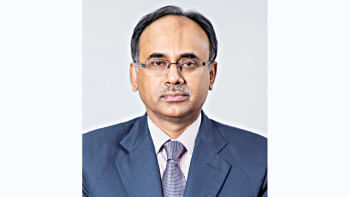New Bangladesh Bank governor’s message to our banking industry

The new governor of Bangladesh Bank (BB) has heralded robust messages to the country's banking and financial industry. Abdur Rouf Talukder, a former finance secretary, is a seasoned man who shepherded the ministry's budgets for FY2021 and FY2022 in the right direction during a most critical time when the Covid pandemic swept the planet. Bangladesh, the most densely populated country with a poor budget for healthcare, was supposed to embrace uncountable deaths and a grave economic disaster. But that didn't happen. Bangladesh was among the few which managed to prevent the recession while major economies plunged into negative growth. Talukder's experience at that time as the finance secretary is expected to be a big plus in leading the central bank.
However, the banking industry is different and complex. It is plagued by the ever-increasing amount of non-performing loans (NPLs), the roots of which are mainly psycho-political in nature – not necessarily economic. Default loans are more than Tk 113,000 crore, which is 166 times bigger than the amount of the unrecovered fund stolen in the heist of 2016 that led the then governor, Dr Atiur Rahman, to resign. The default amount that the press knows now is much lower than the actual, because the definition of default has been changed and sugar-coated on multiple occasions to please the super-rich.
Redefinition or restructuring has always posed hazardous messages, which further encouraged the habitual looters to continue their plundering of people's money from the banks. The new governor must not resort to accepting any sweeter definitions or restructuring proposals from the tycoons and family-based oligarchs. He promised to scale up inspections and implement international standards in capital adequacy. His promise to bring default loans to a reasonable ratio is commendable. That should be his number one commitment, and he must remain credible through action.
The current inflation is mainly supply-shock-driven. And Governor Talukder has no weapon in his monetary arsenal to convince President Vladimir Putin to stop the Russia-Ukraine war. Putin seems to continue his aggression in Ukraine so long as he earns extra profits by selling gas and oil. Bangladesh can't escape the global heat wave of price hikes in energy and commodities. Another reason why inflation will remain stubbornly high is the strengthening of the dollar – not only against the taka, but also against all strong currencies around the globe.
Then, will the Bangladesh Bank sit idle and watch inflation flare up? Not really. It must pay little attention to the ambitious growth rate of 7.5 percent assigned by the finance ministry, and control credit growth particularly for big borrowers. Herein lies the question of independence of a regulator. Governor Talukder, on his very first day, vowed to make the central bank an intellectually and professionally stimulated regulator agency. His mission statement complies with the Bangladesh Bank Order, 1972 and its vital amendment in 2003. He made it clear that he left his job at the secretariat and now led the central bank, where the board would solely frame major decisions. This is the right mindset, which must remain as the lighthouse during his entire navigation of the ship.
Very few governors in recent decades have inherited such a terrible mess that Governor Talukder has just taken up. On top of the ballooned-up default loans, high inflation and depleting forex reserves are the two ominous signs the whole industry is apprehensive to witness. The taka keeps falling every day because of defective non-market exchange rate policy in the past. Import growth has exceeded export, making the trade deficit the highest ever. Remittance growth has fallen, paving the way for higher current account deficits. Consequently, the foreign exchange reserves are sliding to a precarious stage. Money traffickers and hundi lords have geared up to siphon off funds overseas, despite good investment prospects in the local markets. The governor is expected to work tirelessly to first handle the mess that surfaced in the past one year or so, and then to streamline the rules of monetary economics. He will win the battle so long as he is able to convince the prime minister that his actions are theoretically correct – may be temporarily bitter, but sweet for the long-term interest of the economy.

The new governor must strengthen the research department and engage them on different studies required for policymaking. Their findings would be vital for decisions to move forward. Sitting with the monetary policy committee at least once a month or more is imperative. India makes monetary policy at least four times a year, the US eight times, while Bangladesh only once. That may be okay if revision or evaluation meetings are done at least quarterly.
The result of avoiding the researchers or experts, and being cloistered within the circle of conservative deputies didn't prove to be good in the past – nor was the tactic of hiding from financial reporters. Nor was it authentic to let someone else speak on the governor's behalf. The US Fed chair Jerome Powell always faces the journalists after each of his policy steps. The signal is a hundred times more effective when the industry hears anything from the governor, rather than from a spokesperson. That is how a governor is different from a finance secretary, and many in the past forgot that.
Raising the repo rate from 5 to 5.5 percent is fine as a gesture, but worthless as a policy stance to combat inflation until the nine percent ceiling on the lending rate isn't removed entirely. Healthy deposit mobilisation isn't possible until the exorbitantly high non-market interest rates prevail on National Saving Certificates (NSCs) or Sanchayapatra. In a concluding note, the former governor regarded Sanchayapatra as the most expensive borrowing tool of the government, and viewed it as an impediment to the financial market.
The central bank governor must convince the government to reduce NSC rates. NSC ownership should be delivered to the banking sector after dismantling the National Savings Directorate. The Bangladesh Bank is a regulator to help maximise employment, and hence it must require all banks to submit the reports of their annual employment generation – not just simply the reports of bumper profits. If Poet Milton is true in saying "Morning shows the day," Governor Talukder will regain the paradise by strengthening Bangladesh Bank's backbone and transforming the institution into a knowledge-based regulator of the nation's banking industry.
Dr Birupaksha Paul is a professor of economics at the State University of New York at Cortland in the US and former chief economist of Bangladesh Bank.

 For all latest news, follow The Daily Star's Google News channel.
For all latest news, follow The Daily Star's Google News channel. 









Comments